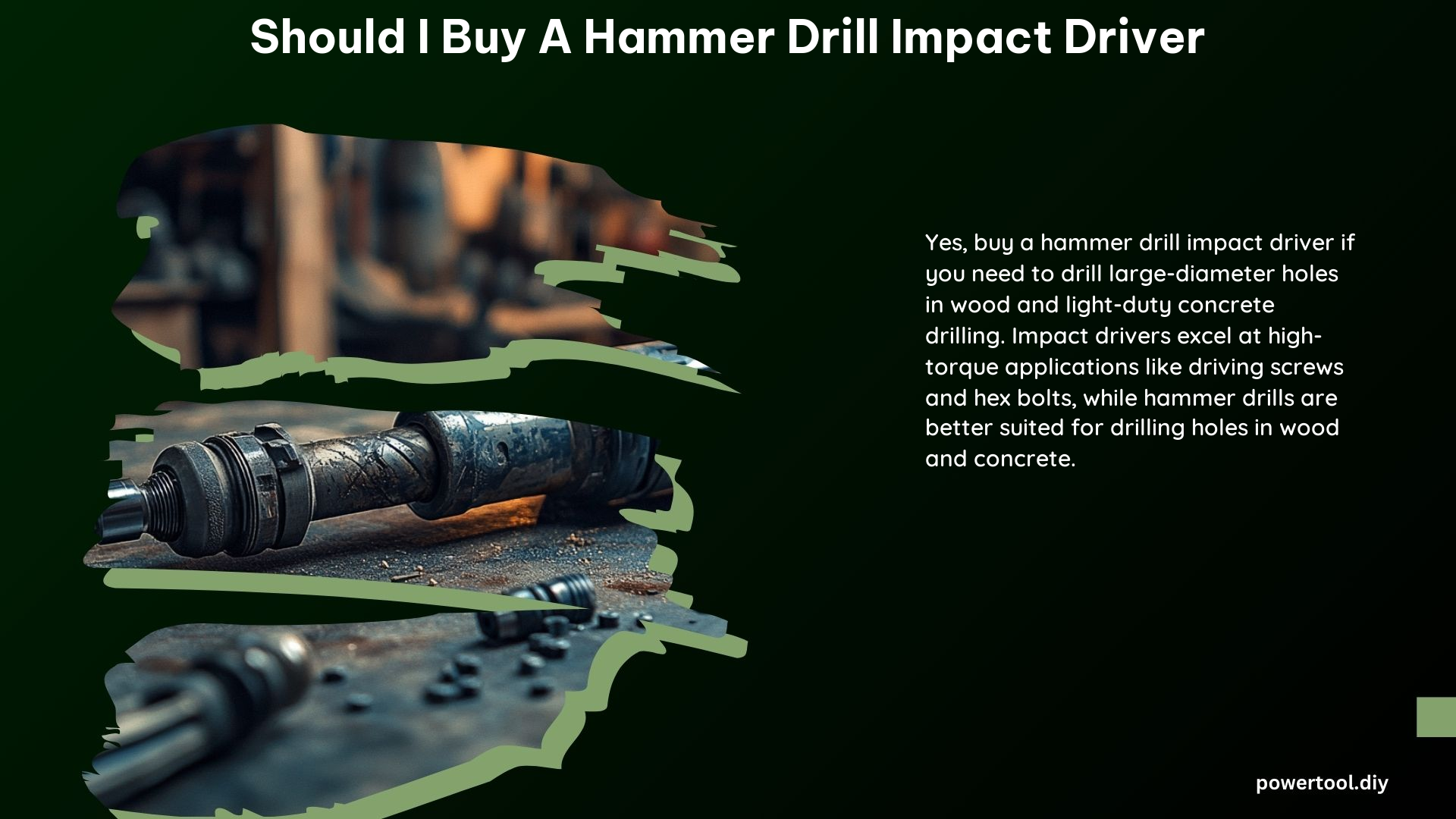When deciding whether to buy a hammer drill or an impact driver, it’s crucial to understand their distinct features, capabilities, and the specific tasks you need to accomplish. This comprehensive guide will delve into the key differences, technical specifications, and recommendations to help you make an informed decision.
Key Differences
Hammer Drill
- Combines a powerful hammering action with strong rotational force, making it ideal for drilling large-diameter holes in wood and light-duty concrete.
- Capable of both drilling holes and driving screws, but not as effective for heavy-duty screw driving tasks.
- Typically heavier and bulkier than impact drivers, with a 1/2″ ratcheting chuck that accepts a wide range of bit diameters.
- Delivers up to 60,000 blows per minute (BPM) for efficient concrete drilling, with a maximum drilling capacity of 1-1/2″ in concrete and 1-1/2″ in steel.
- Offers variable speed control, typically ranging from 0-1,200 RPM, allowing for precise control and versatility in various applications.
Impact Driver
- Specialized for high-torque applications, particularly for driving screws and hex bolts with exceptional speed and power.
- Uses a unique hammering mechanism that acts radially, providing extra torque and rotational force to turn screws with ease.
- Not primarily designed for drilling holes in concrete or masonry, but can handle light-duty drilling tasks.
- Smaller and lighter than hammer drills, with a 1/4″ hex collet that only accepts hex shank bits.
- Delivers up to 3,600 impacts per minute (IPM) and can generate up to 1,800 in-lbs of torque, making it a powerhouse for driving large fasteners.
- Offers variable speed control, typically ranging from 0-3,400 RPM, allowing for precise control and preventing over-driving of screws.
Choosing the Right Tool

Drilling into Concrete
- For drilling into hard concrete, a hammer drill is the best choice as it provides the necessary hammering action to effectively break up the material.
- Hammer drills can handle drilling holes up to 1-1/2″ in diameter in concrete, making them suitable for tasks like installing anchors, lag bolts, or expanding masonry openings.
General DIY Tasks
- If you need a versatile tool for both drilling and driving screws, a hammer drill with a hammer function that can be turned off is a good option. This allows you to use it as a regular drill/driver when needed.
- Hammer drills with a dual-mode function provide the flexibility to switch between hammer and standard drilling modes, catering to a wide range of DIY projects.
Heavy-Duty Screw Driving
- An impact driver is the ideal choice for heavy-duty screw driving tasks, such as installing ledger screws, lag bolts, or driving long screws into dense materials.
- The high-torque and rapid impact mechanism of an impact driver allows you to drive large fasteners with ease, reducing the risk of stripping or damaging the screw heads.
Technical Specifications
Noise Levels
- Impact drivers are generally louder than drills, with a significant difference in decibel levels. Hammer drills can produce noise levels ranging from 90-100 dB, while impact drivers can reach up to 110 dB.
- It’s essential to use appropriate hearing protection when operating these power tools to safeguard your hearing.
Size and Weight
- Impact drivers are typically smaller and lighter than hammer drills, especially in compact models. This makes them more maneuverable and easier to use in tight spaces.
- Hammer drills tend to be bulkier and heavier, with an average weight ranging from 4 to 8 pounds, while impact drivers can weigh as little as 2 to 4 pounds.
Chuck
- Hammer drills feature a 1/2″ ratcheting chuck, allowing them to accommodate a wide range of bit diameters for various drilling tasks.
- Impact drivers, on the other hand, have a 1/4″ hex collet that only accepts hex shank bits, limiting their versatility for drilling applications.
Recommendations
Combo Kit
- Consider purchasing a combo kit that includes both a drill/driver and an impact driver, providing the best of both worlds.
- This setup allows you to have the versatility of a hammer drill for drilling tasks and the power of an impact driver for heavy-duty screw driving, covering a wide range of DIY and construction needs.
Budget Considerations
- If budget is a concern, a cordless drill/driver can be a cost-effective option for general DIY tasks, such as drilling holes and driving screws in wood, drywall, or light-duty materials.
- While a cordless drill/driver may not have the same level of power and performance as a dedicated hammer drill or impact driver, it can still be a practical choice for many homeowners and DIY enthusiasts.
References
- https://www.reddit.com/r/Dewalt/comments/zanpn0/impact_driver_vs_drill_driver_vs_hammer_drill/
- https://thewoodwhisperer.com/articles/drills-vs-hammer-drills-vs-impact-drivers/
- https://www.bobvila.com/articles/hammer-drill-vs-impact-driver-vs-drill/
- https://www.homedepot.com/c/ab/impact-drivers-vs-drills/9ba683603be9fa5395fab9009f66e37
- https://www.protoolreviews.com/impact-driver-vs-hammer-drill/
